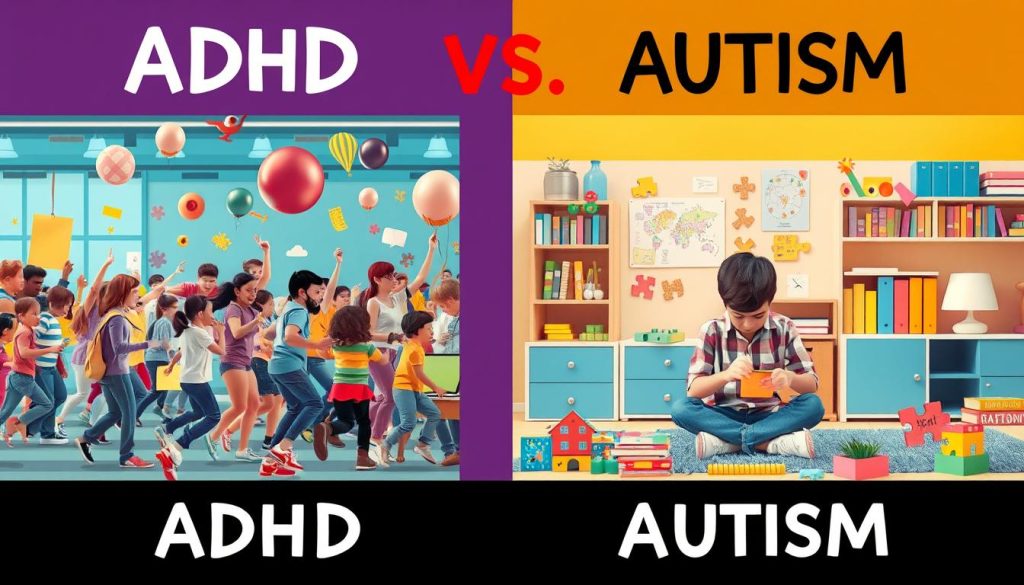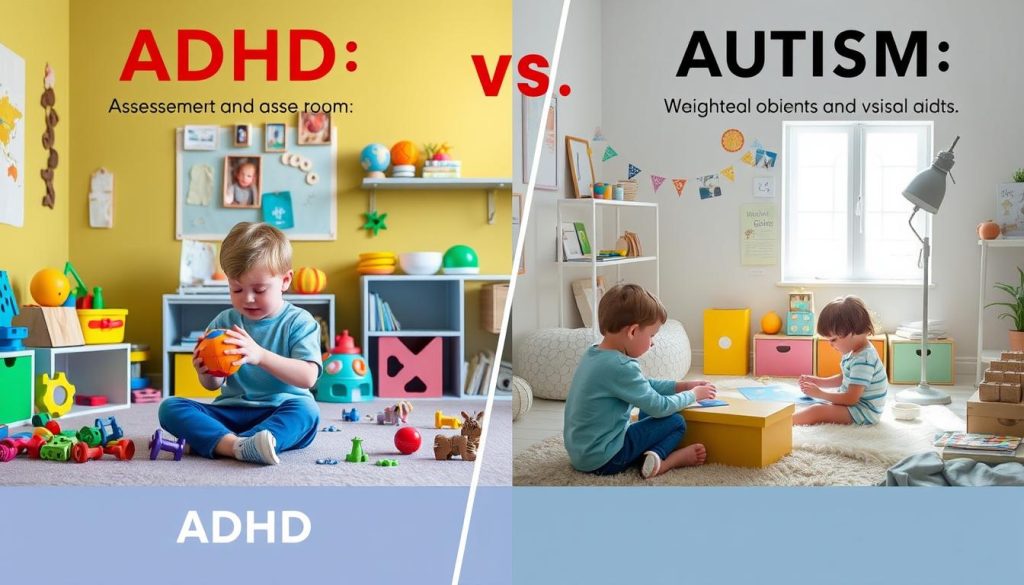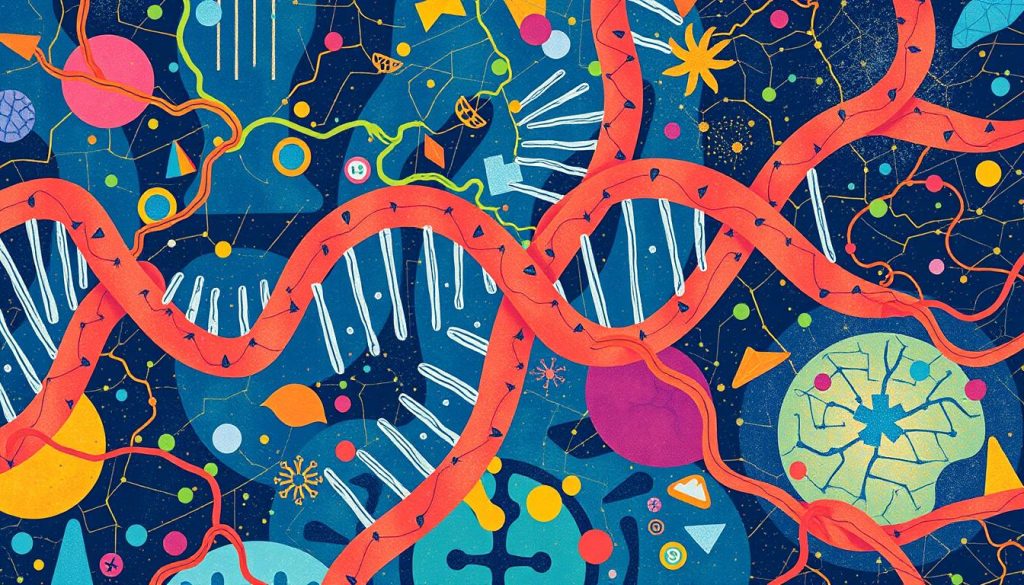ADHD and autism are often mixed up, but they are different neurodevelopmental disorders. Many ask if ADHD is a type of autism spectrum disorder. Let’s sort out this common question and look at the main differences between these conditions.
ADHD symptoms can seem similar to autism’s, causing confusion. Both are neurodevelopmental disorders that affect brain function and behavior. But, they have unique traits that make them different.
It’s important to understand these differences for accurate diagnosis and support. We’ll explore each disorder’s specifics. This will help you understand their unique features and how they affect daily life.
Understanding ADHD and Autism as Distinct Neurodevelopmental Conditions
ADHD and autism are two unique neurodevelopmental disorders. They affect many children and adults. Each has its own characteristics, making them different from one another. Let’s dive into these conditions to understand their nature and impact better.
Defining ADHD and Its Core Characteristics
ADHD, or Attention-Deficit/Hyperactivity Disorder, is marked by persistent inattention, hyperactivity, and impulsivity. Children with ADHD often struggle to focus, follow instructions, and control their impulses. An ADHD diagnosis involves a thorough evaluation of these behaviors across different settings.
Understanding Autism Spectrum Disorder (ASD)
Autism Spectrum Disorder is a complex condition affecting social interaction, communication, and behavior. Autism signs can vary widely, but often include difficulties with social cues, repetitive behaviors, and intense interests in specific topics. Early detection of these signs is key for timely intervention.
The Neurodevelopmental Connection
Both ADHD and autism fall under the umbrella of neurodevelopmental disorders. This means they affect brain development, leading to differences in behavior, learning, and social skills. While distinct, these conditions can sometimes co-occur, making accurate diagnosis and tailored treatment plans essential for effective management.
- ADHD focuses on attention and impulse control
- Autism mainly affects social interaction and communication
- Both are lifelong conditions that begin in childhood
Understanding these key differences helps parents, educators, and healthcare providers offer the right support and interventions. Recognizing the unique challenges of each condition is the first step towards creating inclusive and supportive environments.
Is ADHD Autism? Common Misconceptions Explained
ADHD and autism are often mixed up because they share some symptoms. This mix-up can lead to wrong diagnoses and treatments. Let’s debunk some common myths about these different conditions.

Many think ADHD is a milder version of autism. But this is not correct. Both are brain disorders, but they cause different problems. ADHD mainly affects how you focus and control impulses. Autism, on the other hand, impacts how you communicate and behave socially.
Another myth is that everyone with ADHD or autism shows the same symptoms. But, both conditions have a wide range of symptoms. Each person’s experience can be different, with varying degrees of severity and unique traits.
| Misconception | Reality |
|---|---|
| ADHD is a mild form of autism | ADHD and autism are separate conditions |
| All individuals with ADHD or autism have identical symptoms | Symptoms vary widely among individuals |
| ADHD and autism can’t co-occur | They can be comorbid conditions |
It’s important to know that ADHD and autism can happen together. Some people might have both, needing special treatment plans. Getting a correct diagnosis from doctors is key for the right support and care for these brain disorders.
Key Differences in Social Interaction and Communication
Social skills and communication are key to understanding ADHD and autism spectrum disorder. Both conditions affect social interactions, but in different ways.
Social Challenges in ADHD
People with ADHD often miss social cues because of inattention or impulsivity. They might interrupt others, miss subtle hints, or have trouble waiting their turn. These issues can make it hard to build and keep relationships.
Communication Patterns in Autism
Autism spectrum disorder affects communication more deeply. People with autism might struggle to understand sarcasm, metaphors, or nonverbal cues. Some may speak in a monotone voice or find it hard to have back-and-forth conversations. These problems come from how they process social information.
Distinguishing Social Behaviors
The main difference is why social difficulties occur. ADHD social challenges often come from impulsivity or inattention. Autism spectrum disorder, on the other hand, affects how people understand social norms and communicate. Knowing these differences helps in giving the right support and interventions for each condition.
Behavioral Patterns and Executive Functions
ADHD symptoms and autism signs often involve challenges with executive functions. These brain processes help us plan, focus, and manage daily tasks. While both conditions affect these areas, they do so in unique ways.
Children with ADHD typically struggle with attention and impulse control. They might find it hard to sit, often interrupting others or acting without thinking. On the other hand, those with autism may show intense focus on specific interests but struggle to shift their attention when needed.
Organization skills also differ between the two conditions. Kids with ADHD often have messy rooms and lose things easily. Autistic children might insist on strict routines and become upset when these are disrupted. Recent research suggests that executive function deficits are more closely tied to ADHD symptom severity than autism severity.
| Executive Function | ADHD | Autism |
|---|---|---|
| Attention | Easily distracted | Hyper-focused on interests |
| Impulse Control | Poor self-regulation | Rigid behaviors |
| Organization | Difficulty with time management | Strong preference for routines |
Understanding these differences can help parents and teachers provide targeted support for children with ADHD symptoms or autism signs. By recognizing unique behavioral patterns, we can create strategies that cater to each child’s specific needs.
Sensory Processing Differences Between ADHD and Autism
Sensory processing is key for those with autism spectrum disorder and ADHD symptoms. It shapes how they see the world. Knowing these differences helps in supporting them better.
Sensory Sensitivity in Autism
Autism often brings heightened sensory sensitivity. People with autism might find everyday sounds and lights too much. This can cause stress or meltdowns in daily life.
Sensory Processing in ADHD
Some with ADHD symptoms also face sensory challenges. They might crave intense sensory experiences or find it hard to ignore background noise. This can affect their focus and attention.
Impact on Daily Living
Sensory differences change daily life for both groups. For autism, it might mean avoiding certain places or activities. ADHD might find quiet settings hard or seek constant movement. It’s important to understand these impacts to create supportive environments.
| Aspect | Autism Spectrum Disorder | ADHD |
|---|---|---|
| Sensitivity Level | Often hypersensitive | Can be hyper or hyposensitive |
| Common Triggers | Loud noises, bright lights, textures | Background noise, visual distractions |
| Coping Strategies | Noise-canceling headphones, quiet spaces | Fidget tools, movement breaks |
Diagnostic Criteria and Assessment Methods

Getting a diagnosis for ADHD or autism needs careful work from healthcare experts. They collect info from many places. They also use special tools to check symptoms and actions.
Doctors look for signs of ADHD like not paying attention, being too active, and acting on impulse. These signs must affect daily life. They use rating scales, interviews, and watching how people act in different places like home and school.
When checking for autism signs, doctors do developmental screenings and detailed assessments. These might include:
- Watching how people interact and communicate
- Looking at language growth and play
- Checking for sensitivity to senses and repeating actions
Doctors follow the Diagnostic and Statistical Manual of Mental Disorders (DSM-5) for their checks. This helps them diagnose both conditions the same way.
It’s key to know that ADHD and autism have different signs. A detailed check helps tell them apart. This guides the right treatment plans.
Overlapping Symptoms and Co-occurring Conditions
ADHD and autism often share similar traits, making diagnosis challenging. Many individuals experience symptoms of both conditions, leading to confusion and misdiagnosis. Understanding these overlaps is key for proper treatment and support.
Common Shared Traits
ADHD and autism share several characteristics that can make them hard to distinguish. Both conditions may involve:
- Difficulty with focus and attention
- Challenges in social situations
- Trouble with executive functioning
- Sensory processing issues
These similarities can lead tomisdiagnosis or delayed diagnosisin some cases.
Understanding Comorbidity
Comorbid conditions refer to disorders that occur together. ADHD and autism can coexist, complicating diagnosis and treatment. Research shows that about 30-80% of individuals with autism also meet criteria for ADHD. This overlap highlights the need for thorough evaluations.
| Condition | Prevalence of ADHD Comorbidity |
|---|---|
| Autism | 30-80% |
| General Population | 5-7% |
Recognizing the possibility of comorbid conditions is vital for effective treatment plans. Healthcare providers must consider both ADHD and autism when assessing patients. This ensures accurate diagnosis and appropriate interventions.
Treatment Approaches for ADHD versus Autism
ADHD treatment and autism therapy have different focuses. ADHD treatment aims to manage symptoms and improve daily life. Autism therapy works on improving communication and social skills.

For ADHD, treatment often includes medication and behavioral therapy. Medications like methylphenidate help with focus and reduce hyperactivity. Behavioral therapy teaches strategies for managing impulsivity and improving organization.
Autism therapy uses various specialized methods. Applied Behavior Analysis (ABA) teaches new skills and reduces challenging behaviors. Speech and occupational therapy are key for better communication and daily skills. Some may also need social skills training.
| Treatment Aspect | ADHD | Autism |
|---|---|---|
| Primary Focus | Attention and hyperactivity | Social communication and behavior |
| Medication | Common (stimulants, non-stimulants) | Less common (for specific symptoms) |
| Behavioral Interventions | Cognitive Behavioral Therapy | Applied Behavior Analysis |
| Therapy Types | Individual and family counseling | Speech, occupational, and social skills therapy |
Though treatments vary, both conditions benefit from early intervention and tailored plans. Families and healthcare providers must collaborate to create personalized treatment plans. These plans should meet each individual’s unique needs and strengths.
Early Signs and Detection in Children
It’s important to spot ADHD and autism signs early in kids. Parents and caregivers need to know about developmental milestones and red flags. These can show if a child might have these conditions.
ADHD Indicators in Early Childhood
ADHD symptoms often show up in preschool years. Kids with ADHD might:
- Have trouble focusing on tasks
- Fidget a lot or squirm
- Interrupt others or talk too much
- Struggle to follow instructions
- Show impulsive behavior
Autism Red Flags in Development
Autism signs can start as early as infancy or toddlerhood. Some common signs include:
- Not making eye contact
- Being slow to talk or not babbling
- Doing the same things over and over
- Having trouble with social interactions
- Reacting strangely to sounds or sights
Spotting ADHD and autism signs early helps get help fast. If you see these behaviors in your child, talk to a doctor or specialist. Every child grows at their own pace. But, acting early can help a lot.
Impact on Learning and Educational Support
ADHD and autism are neurodevelopmental disorders that can change how a student learns. Kids with these conditions face special challenges in school. They need support to do well in their studies.

Students with ADHD might find it hard to focus, stay organized, and control their impulses. This can cause them to miss assignments, manage time poorly, and act out in class. Kids with autism might struggle with social skills, talking to others, and adjusting to new situations.
There are ways to help these students in school:
- Individualized Education Plans (IEPs)
- Classroom accommodations
- Specialized teaching methods
- Assistive technology
IEPs are key for students with ADHD and autism. They set goals, accommodations, and support services based on each child’s needs. For ADHD, this might mean sitting in a better spot, getting more time on tests, or taking breaks. Autism students might benefit from visual schedules, headphones to block out noise, or help with social skills.
Teachers are very important in helping these students. By knowing the challenges of ADHD and autism, teachers can make school a better place for everyone. This helps all students do well in school and make friends.
Managing Daily Life: Strategies and Accommodations
Living with ADHD or autism can be tough, but the right help makes a big difference. We’ll look at ways to handle daily tasks and make supportive spaces.
ADHD Management Techniques
Managing ADHD often means using medicine and behavioral tips. Good methods include using planners, breaking tasks into smaller parts, and setting reminders. A set routine helps keep things organized and focused.
- Use visual schedules
- Implement time management tools
- Establish a reward system for completed tasks
Autism Support Strategies
Autism therapy aims to boost communication, social skills, and handle sensory issues. Applied Behavior Analysis (ABA) teaches new skills and reduces bad behaviors. Visual aids and social stories help with daily tasks and social interactions.
Creating Supportive Environments
Both ADHD and autism do well in environments that reduce distractions and meet their needs. This might include noise-canceling headphones, fidget toys, or quiet areas. Working with schools and workplaces to add accommodations is key to success.
| ADHD Accommodations | Autism Accommodations |
|---|---|
| Flexible seating options | Sensory-friendly lighting |
| Frequent movement breaks | Visual schedules and timers |
| Color-coded organization systems | Noise-reducing headphones |
By using these strategies and creating supportive places, people with ADHD or autism can handle daily life better. They can reach their highest goals.
The Role of Genetics and Environmental Factors
Neurodevelopmental disorders like ADHD and autism have complex origins. Scientists believe both genes and environment play key roles in their development. Research shows these conditions run in families, pointing to a strong genetic link.

Studies of twins reveal that ADHD is highly heritable. If one twin has it, the other is likely to as well. Autism also shows genetic patterns, but it’s more complex. Scientists have identified many genes that may contribute to autism risk.
Environmental factors matter too. Prenatal exposure to certain chemicals or infections may increase the chances of developing these disorders. Premature birth and low birth weight are also linked to higher rates of ADHD and autism.
While we can’t change our genes, understanding environmental risks is key. This knowledge can help support individuals with autism and ADHD. By focusing on modifiable factors, we may reduce the impact of these neurodevelopmental disorders.
Ongoing research aims to uncover more about how genes and environment interact. This could lead to better prevention strategies and treatments for ADHD and autism in the future. As our understanding grows, so does our ability to help those affected by these conditions.
Latest Research and Scientific Understanding
Recent studies have brought new insights into ADHD and autism. Scientists have found interesting connections between brain structure and these conditions. Advanced imaging shows how brains with ADHD and autism process information differently.
Researchers are looking into genetic factors for ADHD and autism. They’ve found several genes that might raise the risk of these conditions. This could lead to better screening and treatments in the future.
There’s also progress in understanding environmental factors for ADHD and autism. Studies are examining prenatal exposure to chemicals and early childhood experiences. These findings could help in preventing and treating these conditions early on.
As we learn more, new care options are emerging. New therapies are being developed to target specific symptoms of ADHD and autism. From brain-training games to new medications, these advancements offer hope for better management of both conditions.
FAQ
Q: Is ADHD a form of autism?
A: No, ADHD is not a form of autism. Both are neurodevelopmental disorders but different. ADHD affects attention and impulse control. Autism impacts social communication and behavior.
Q: Can a person have both ADHD and autism?
A: Yes, it’s possible for someone to have both ADHD and autism. This is called comorbidity. Studies show many with autism also have ADHD, and vice versa. Each condition needs its own diagnosis and treatment.
Q: How can I tell the difference between ADHD and autism?
A: While symptoms can overlap, there are key differences. People with autism often struggle with social cues and communication. Those with ADHD may be socially active but impulsive.
Autism often includes repetitive behaviors and sensory sensitivities. ADHD is more about attention and impulse control. A professional evaluation is needed for an accurate diagnosis.
Q: What are the early signs of ADHD in children?
A: Early ADHD signs in children include excessive fidgeting and trouble staying seated. They may have trouble waiting their turn and interrupting others. Difficulty focusing and not listening are also signs.
They might lose things needed for tasks or activities. These behaviors should be more severe than usual for their age.
Q: What are the early signs of autism in children?
A: Early autism signs in children include limited eye contact and delayed speech. They might have repetitive behaviors or intense interests. Difficulty with changes in routine and unusual reactions to sensory input are also signs.
They may also show little to no pretend play. Early intervention is key, so consult a healthcare professional if you notice these signs.
Q: How are ADHD and autism diagnosed?
A: Both ADHD and autism are diagnosed through detailed evaluations. These include medical history reviews and behavioral observations. Standardized questionnaires and cognitive testing are also used.
For autism, the ADOS (Autism Diagnostic Observation Schedule) is often used. For ADHD, continuous performance tests and other assessments are employed. A qualified healthcare professional should conduct these evaluations.
Q: What treatments are available for ADHD?
A: ADHD treatment often includes behavioral therapy and medications. Educational support and lifestyle changes are also important. Parent training helps support the child’s behavior and development.
Q: What therapies are effective for autism?
A: Effective autism therapies include Applied Behavior Analysis (ABA) and speech and language therapy. Occupational therapy and social skills training are also helpful. Cognitive Behavioral Therapy (CBT) addresses anxiety and other conditions.
Early intervention is key to maximizing outcomes for individuals with autism.
Q: Can ADHD or autism be cured?
A: Neither ADHD nor autism can be “cured” as they are lifelong conditions. But, with proper diagnosis and treatment, individuals can manage their symptoms. The focus is on developing coping strategies and building on strengths.
Providing appropriate accommodations supports success in various life domains.
Q: How do sensory processing issues differ between ADHD and autism?
A: Sensory processing issues are more common and severe in autism than in ADHD. Autism individuals may be hypersensitive or hyposensitive to sensory input. This leads to strong reactions or indifference to stimuli like sounds, lights, or textures.
ADHD individuals might experience sensory processing difficulties, but these are generally less intense. They might be distractible or seek intense sensory experiences. Understanding these differences helps in developing appropriate coping strategies and environmental modifications.

















